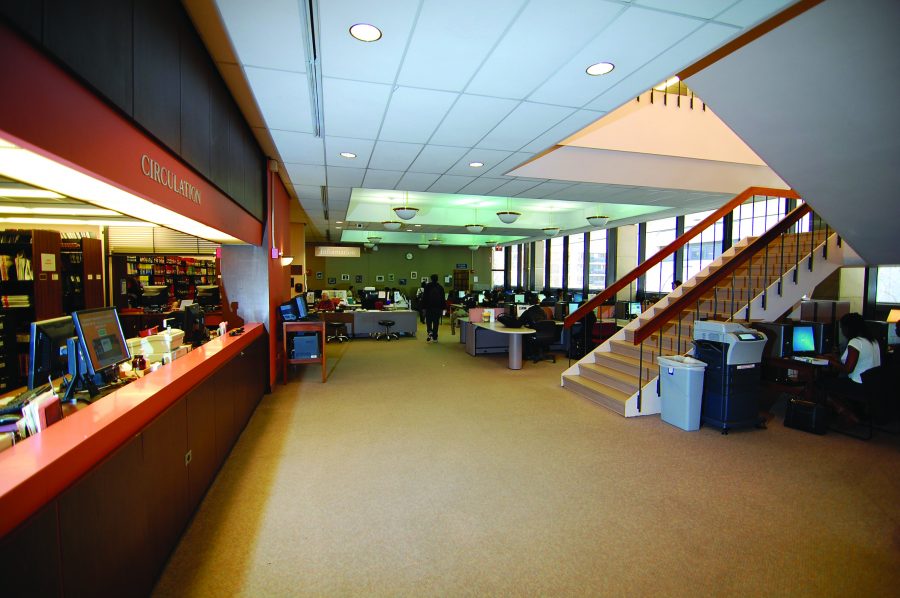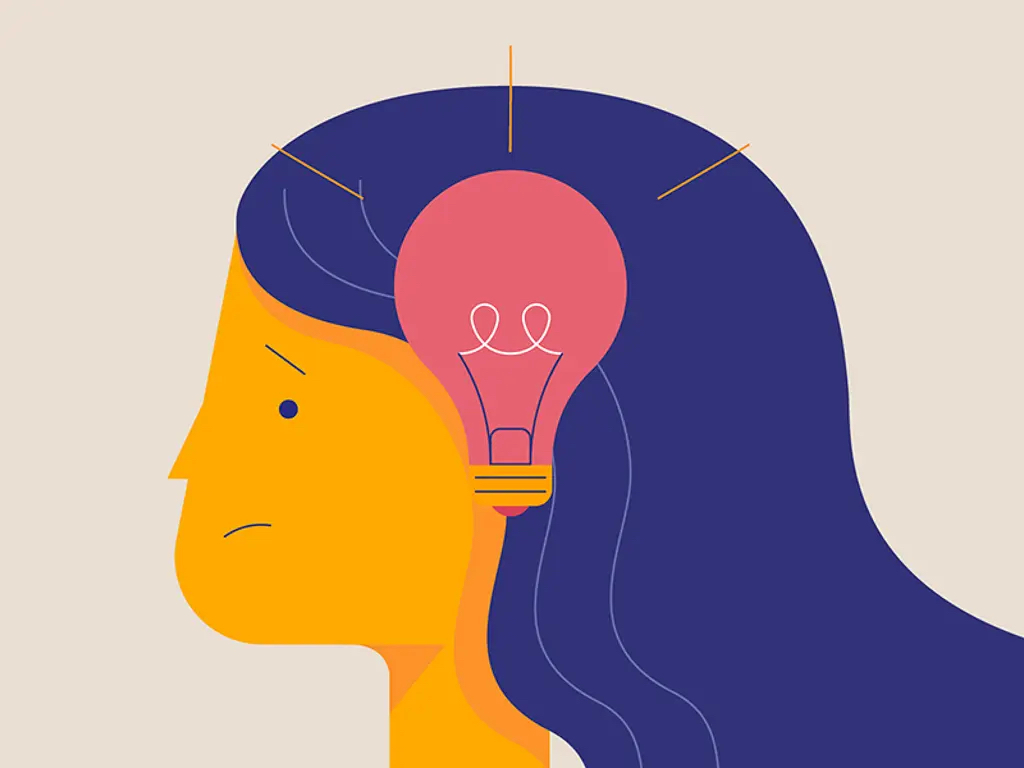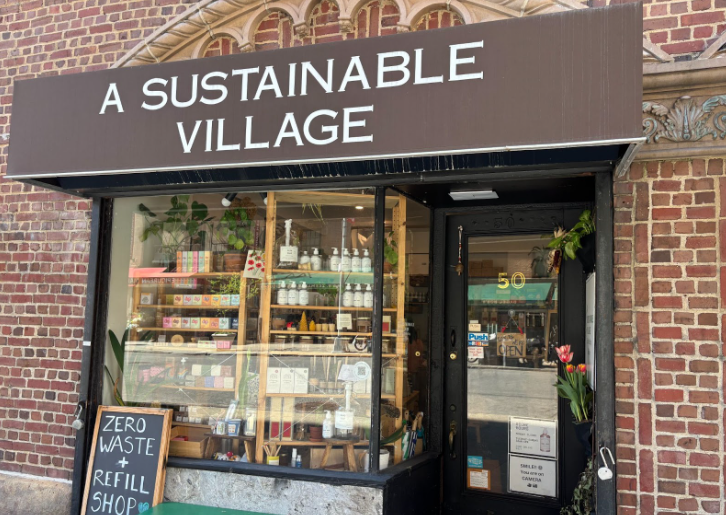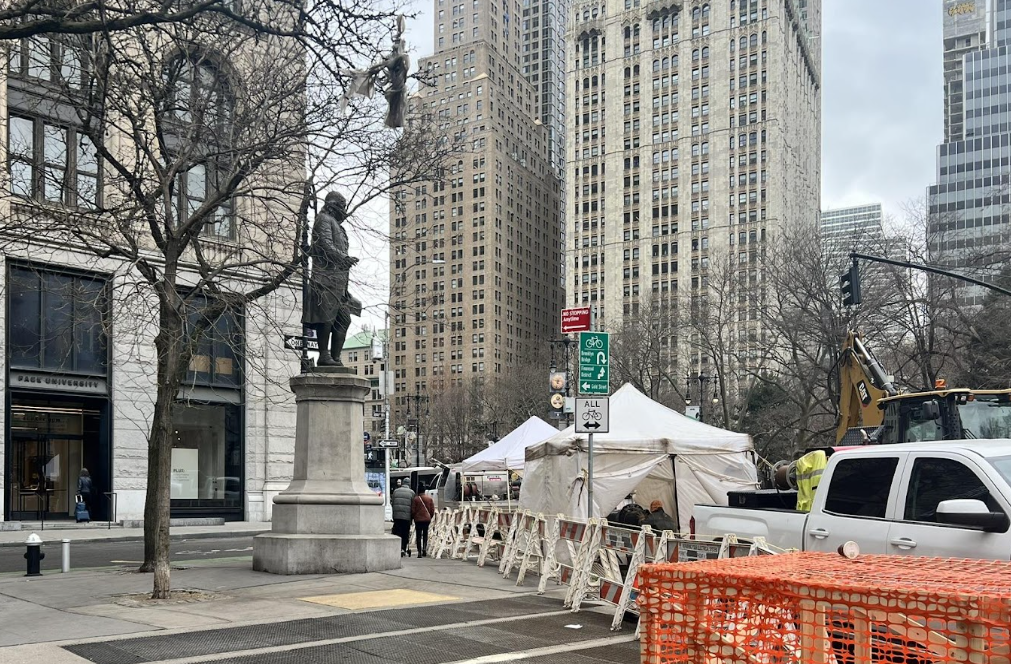Upon returning from winter recess, students at the University can’t help but notice the recent massive construction overhaul. The University has constructed a brand new honors lounge, complete with new furniture, carpeting, painting and kitchen appliances, a $3.1 million update to the science laboratories, with 10 new fully equipped labs and brand new carpeting, painting and desks in upper level classrooms. Additionally, Birnbaum library has undergone updates, dipping into their allocated budget of $450,000 towards improvements. From that large sum of money, $150,000 was allotted to new carpeting, painting and chairs. Something far more vital than carpeting and chairs, however, is missing from the update: an elevator with access to the second floor, where all loanable materials and a vast majority of the study areas are located. Though the construction will continue through the next several years, there is currently no scheduled plan for the addition of an elevator.
“Buildings and grounds were informed and are aware of the need. In the full proposal I gave I made several recommendations and I have pointed out about the elevator—I suggested a lift. A full elevator may not be possible in the area,” said Rey Racelis, the University Library Director. In the three years that Racelis has held the position of director, he has continually revisited the issue, but was never met with any concrete plans to construct a lift.
Currently, injured or disabled students are forced to ask a library staff member to obtain a key to the elevator, which stands a considerable distance outside of the library, in order to gain access to the second floor. Library staff must escort individuals once the key is obtained. This means staff members must leave their desk and inconvenience other students waiting for assistance. In this rather inefficient structure, students are either left in line waiting for elevator access, or left in line waiting for assistance with library and database materials from library staff.
“It’s inconvenient for people with disabilities because we all have to study and have the same accessibility at the library, and we don’t feel like we’re getting that right now. I don’t feel I have as much access as other people. The library looks great but it’s not good for me,” said freshman Temir Zhomartov.
With indication that the idea of an elevator is being discussed, many are wondering just when the idea will move from a discussion to actual action. Physical Plant Director Ibrahima Bagate pointed out that the older chairs were the first major concern, as staples coming out of them were poking students. “The chairs were unsafe and had to be replaced and so did the carpet, and those were low cost items. There are so many other needs at the university that we need to meet in order to serve the students at large as a whole as opposed to one single aspect, but we are doing whatever we can to meet everyone’s needs at this point. I can’t really tell you when it’s going to happen but it’s been discussed,” said Bagate.
While the issue of equal accessibility is being “discussed,” students who are injured or permanently disabled are growing weary of the run-around and lack of progress.
“I recently injured myself. I had to get glass taken out of my foot, so I’m on crutches for the time being. The fact that the library does not have an elevator is a huge inconvenience. I see new updates everywhere—new paint, new carpet—but what about updates for people who are injured or have disabilities? Now if I want to get upstairs to study and take out books, I have to go out of my way to hassle a librarian who is already helping students to escort me upstairs. That doesn’t seem fair, or right,” said junior Stephen Socci.
Jordan Gonsalves, a student assistant at Birnbaum library, said that the stairs have also been a hazard to able bodied students in more than one instance. “There’s definitely unsafe conditions on the stairs. In two separate instances I saw people fall down the stairs while I was working. One injured himself pretty badly. There was blood everywhere on the stairs, and his belongings were strewn everywhere. It’s unsafe, we should have an elevator,” said Gonsalves. “It makes you realize where the university’s priorities really are.”
Even with dismissal of the university priorities, one cannot deny the honest legal matter of the situation. Liz Savage, an Attorney working for the Americans With Disabilities Act information center said that the University’s actions could be considered unjust, stating, “They have an obligation that is ongoing. Every year they’re supposed to put money aside to make access better.”
As stated in the Americans with Disabilities Act, “a public accommodation should take any other measures necessary to provide access to the goods, services, facilities, privileges, advantages, or accommodations of a place of public accommodation. Any alteration to a place of public accommodation or a commercial facility, after January 26, 1992, shall be made so as to ensure that, to the maximum extent feasible, the altered portions of the facility are readily accessible to and usable by individuals with disabilities, including individuals who use wheelchairs.”
The equal access required by the Act is difficult to find when students with disabilities are forced to take extra measures just to get one floor up to maximize the resources their peers are able to access with ease.
Other students are angered by the fact that they have little information or control as to where the money they invest in the University is going.
“Pace makes so much money and takes so much of our money. We have to give around $54,000 for our entire four years here. So if you’re taking such a substantial amount of our money, the university should be able to provide elevators. I want to know where my money is going. If they can use so much money in other renovations, they should be able to afford an elevator, or be putting aside that money to save for one,” said freshman Ashley Johnson.
Unfortunately, the addition of an elevator seems to remain in a permanent state of “discussion.” When asked for an anticipated date for the possible installation of an elevator or lift accommodation, Bagate solemnly responded, “There is no date set. It is not currently in the plan.”



















